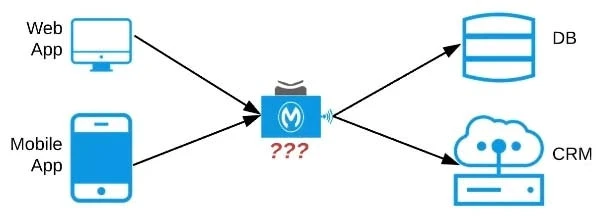Traffic between Mule applications deployed to an Anypoint VPC and on-premises systems can indeed stay within a private network. This is achieved through secure connectivity options such as IPsec tunnels or AWS Direct Connect. By using these methods, data can traverse privately and securely, ensuring that the traffic remains within a secured network without exposing it to the public internet.
How can an alert be set up that is guaranteed to trigger AS SOON AS that API implementation stops responding to API invocations?
To set up an alert that is guaranteed to trigger as soon as the API implementation stops responding to API invocations, the best option is to configure a 'worker not responding' alert in Anypoint Runtime Manager. This solution provides immediate monitoring and alerting of the worker's status, ensuring timely detection of any unresponsiveness. Other options either require additional implementation effort, like external health checks, or may not be as reliable or immediate in detecting the issue.
What is a valid approach that minimizes the impact of this change on API clients?
The best approach to minimize the impact of changes on API clients is to implement the required changes to the Process API implementation in such a way that the RAML definition remains unchanged whenever possible. This ensures that clients relying on the existing API definition do not experience disruptions or need to make modifications to their integrations.

An organization needs to enable access to their customer data from both a mobile app and a web application, which each need access to common fields as well as certain unique fields.
The data is available partially in a database and partially in a 3rd-party CRM system.
What APIs should be created to best fit these design requirements?
To meet the design requirements of enabling access to customer data from both a mobile app and a web application, it's essential to have separate Experience APIs for the mobile and web apps. This allows each app to have tailored experiences and access specific fields as needed. However, a common Process API is practical for handling the integration and business logic, ensuring consistency and reusability. This Process API can then invoke separate System APIs that interact with the database and the CRM system to retrieve the necessary data. This setup ensures modularity and flexibility, enabling future scalability without significant changes to the API structure.

A developer is building a client application to invoke an API deployed to the STAGING environment that is governed by a client ID enforcement policy.
What is required to successfully invoke the API?
To successfully invoke an API governed by a client ID enforcement policy in the STAGING environment, the client application must provide the client ID and secret specific to the API instance in that environment. These credentials are typically obtained directly from Anypoint Exchange for the API instance in the STAGING environment. This is because client ID and secret are used to uniquely identify and authenticate the client application interacting with a specific API instance, ensuring proper access control.